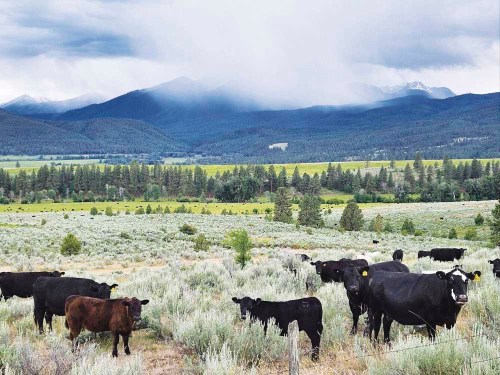Farm, dairy consolidation on the rise in Oregon and nationwide
Published 5:45 am Tuesday, March 12, 2024

- Cattle graze in southern Union County as a rain squall covers part of the Elkhorn Mountains west of North Powder in 2023.
SALEM — The average farmer in Oregon is getting older or getting out, is more energy efficient and likely farming on more acres than in generations past.
These are just a few key data points in the latest Census of Agriculture published by the U.S. Department of Agriculture last month. It’s undertaken every five years by the agency, and the latest report details changes between 2017 and 2022. It includes more than 6 million data points about the state of American farms and ranches down to the county level.
In Oregon and nationwide, the census shows a rapid consolidation of farms and an increase in the number of animals on smaller swaths of land as confined animal feeding operations, or CAFOs, become the norm for raising thousands of livestock for dairy, egg and meat production.
As of 2022, there were about 35,500 farms and ranches in Oregon, a decrease of 6% since 2017. The average size of farms in the state, however, grew by about 1%, with 3% of the state’s farms accounting for three-quarters of all agricultural goods produced in the state in 2022.
About 25% of all land in Oregon is used for agriculture, according to the report. In total, the state’s farms and ranches produced more than $6.7 billion worth of products in 2022, up more than $1 billion from 2017.
The state has not been spared from a nationwide wave of consolidating dairies. Oregon lost more than 120 small dairies between 2017 and 2022, while the number of dairy cows raised in large operations increased. The number of dairy cows raised in industrial operations in Oregon grew 60% between 2002 and 2022, according to an analysis of the USDA census data during the last two decades by the advocacy group Food & Water Watch.
The state’s largest cooperative dairy, Tillamook County Creamery Association, is currently being sued in a lawsuit over “greenwashing” claims brought against it by the Animal Legal Defense Fund and four Oregon consumers. The Oregonian/OregonLive reported that the state Supreme Court is determining whether to allow the case to move forward as a class action. The plaintiffs argue that the cooperative, selling dairy products under the “Tillamook” brand, advertises its products as being made with milk from small family dairies on the Oregon Coast. But the bulk of the milk sourced for Tillamook products — more than two-thirds — comes from the state’s largest dairy operation — Threemile Canyon Farms — near Boardman. The state Department of Agriculture has issued a permit to the dairy for 28,000 cows.
Oregon farms are increasingly using renewable energy: The report shows a nearly 25% increase in the number of farms using renewable energy for at least some of their needs, with 90% sourcing from solar panels.
The age of the average Oregon farmer rose slightly since 2017, from 57.9 years to 58.6 years. Just 7% of the state’s farmers and ranchers are under 35 years old and nearly half of the state’s farmers and ranchers are women, according to the census data.
The 20 members of the Early Literacy Educator Prep Council include experts and representatives from schools, the state and a tribe. They are:
To comment on the proposed standards, visit www.surveymonkey.com/r/QJQBBJM









